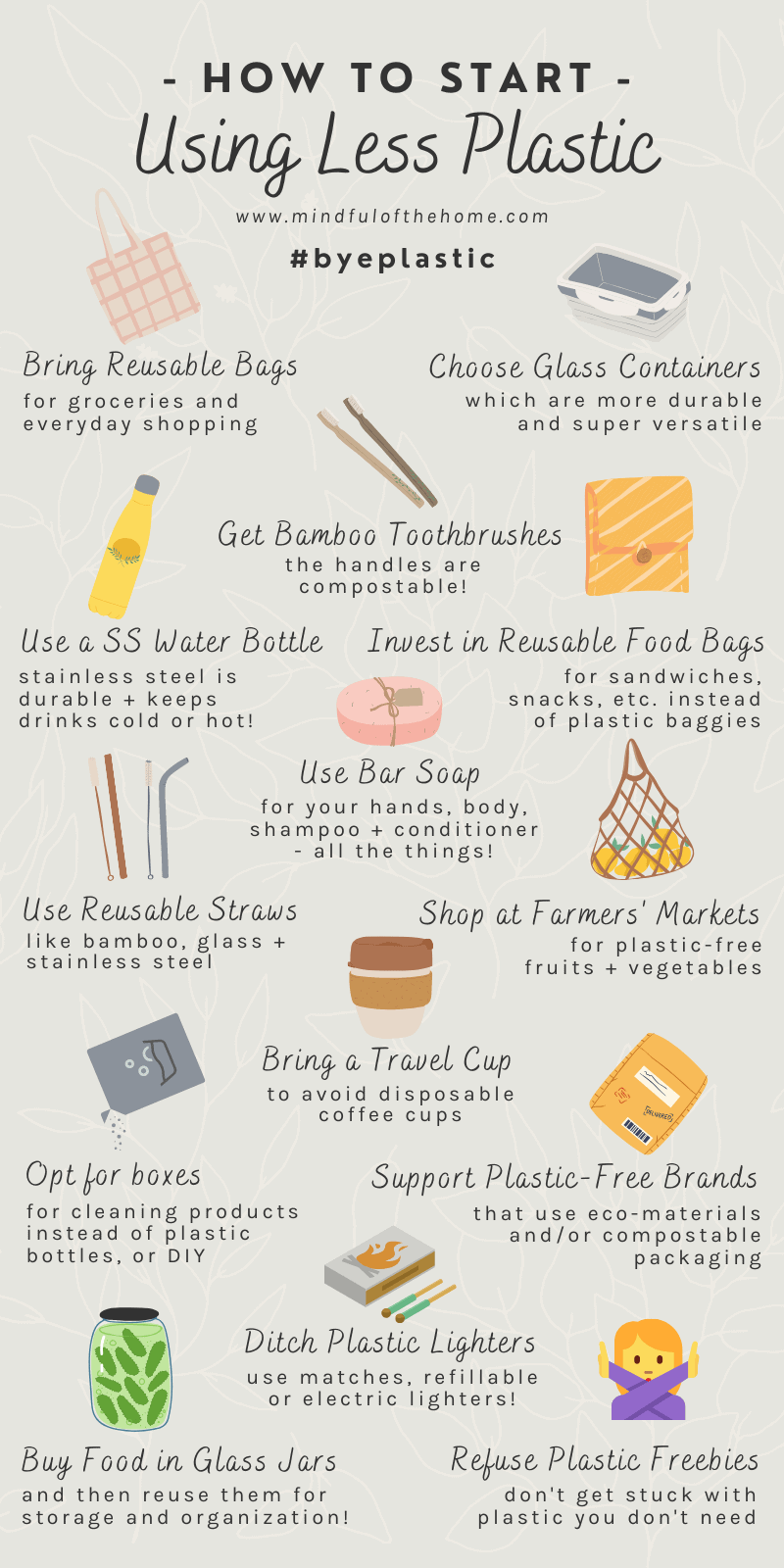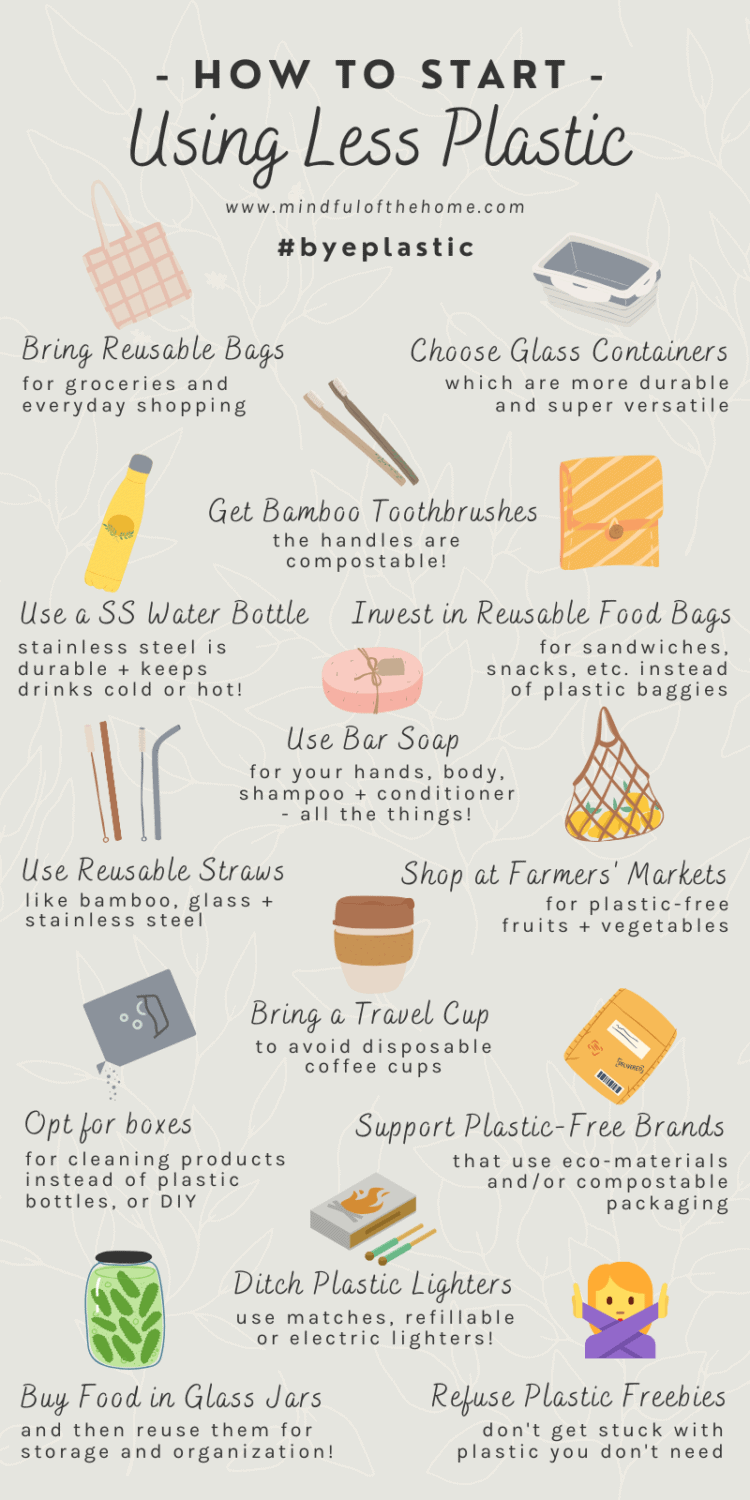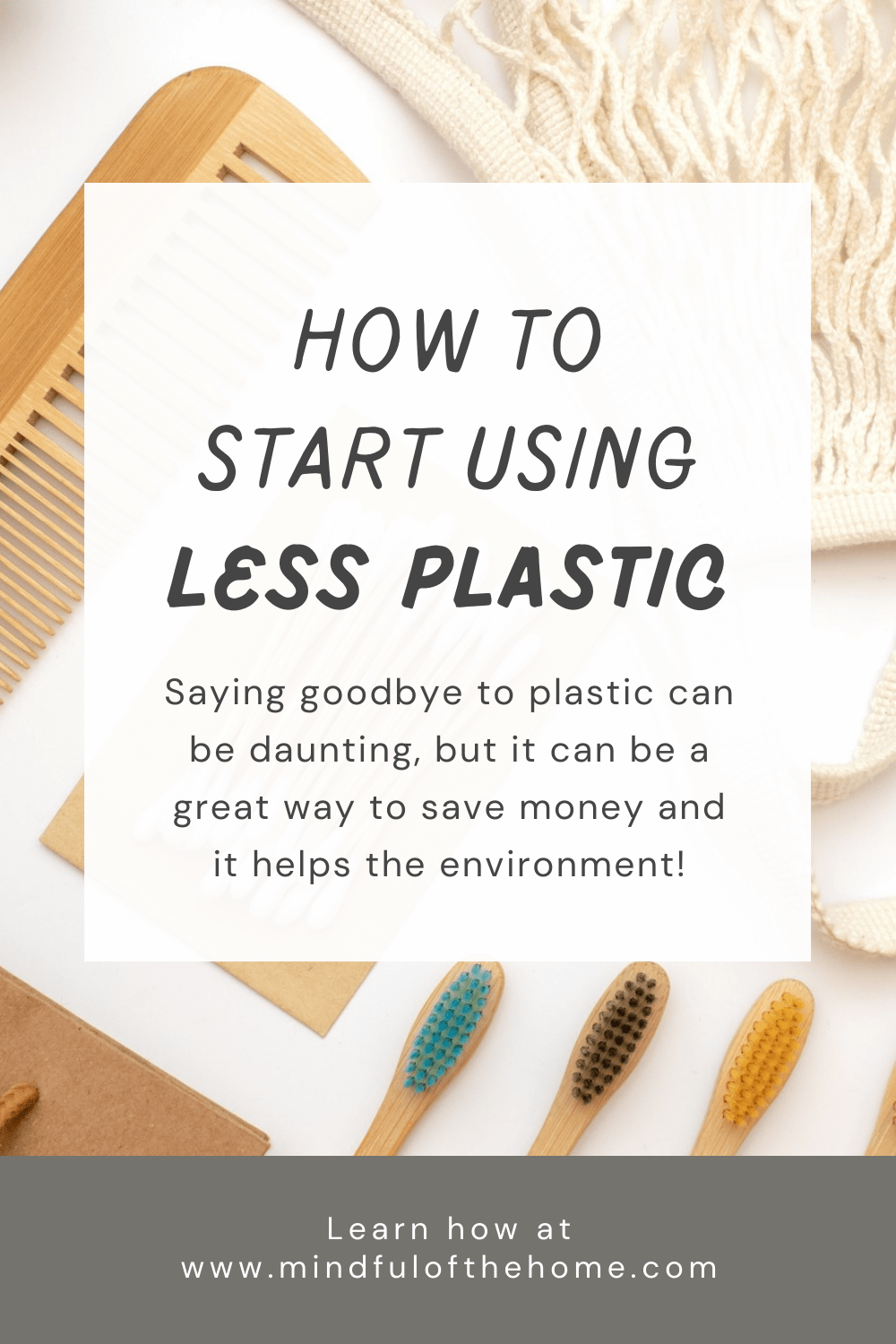It’s common knowledge that single-use plastic is bad for the environment and that it threatens our planet. That means it’s so important to learn how to use less plastic and practice more sustainable methods of living.
Something to keep in mind is that you don’t have to make huge lifestyle changes right off the bat, and you don’t need to be perfect!
Even making the smallest changes in your day-to-day life can have a large impact on the environment.
Using plastic products is entirely in our control. And the less plastic used, the less will be produced, and that means less plastic in our landfills.
Because that’s the reality.
Why should we use less plastic?
A lot of plastics aren’t recyclable which means they’ll head to a landfill where they will leak chemicals into the earth or get blown into waterways which leads to oceans, which will then get mistaken for food by animals.
Whether you want to use less plastic to save our oceans, for health reasons, or to save money, these easy tips will help you start saying goodbye to plastic once in for all.
This post contains affiliate links which means I may receive a commission at no extra cost to you should you click through and make a purchase.
Here are 14 cheap and easy ways you can use less plastic in your home.
1. Use Reusable Grocery Bags
Instead of using flimsy single-use plastic bags from the grocery store, bring your own reusable bags every time you do groceries.
Not only is investing in a reusable bag the best zero-waste option, but it’s also a lot easier to carry your groceries with them.
You should also bring your own zero-waste produce bags to put your fruits and veggies in, instead of reaching for those disposable plastic bags that grocery stores offer.

2. Use Plastic-Free Food Storage
Instead of continuing to purchase plastic containers once yours inevitably break, invest in food containers that are longer lasting.
Glass and stainless steel are a great plastic alternative because they’re sustainable, easy to clean, non-toxic, and recyclable. You can also freeze meals in glass and stainless steel containers.
You can also use other storage methods that aren’t containers, like beeswax wraps and reusable “Ziploc” bags.
Here are some great plastic-free alternatives:
- Beeswax wraps are 100% natural and will last you over a year.
- Stainless steel containers – pretty much indestructible and BPA-free.
- Silicone Sealer Bags are good for storing, freezing and cooking.
- Food Huggers are perfect for covering cans, certain fruits and vegetables, and more!
If you really don’t want to transition from plastic containers, opt for containers that use recycled plastic.
Whatever plastic containers you have left, use them until they’re broken, use them for alternative storage, or recycle them!
3. Bring Your Own Coffee Cup

Another great way to use less plastic is to buy a reusable coffee cup.
When you buy takeout coffee, those single-use coffee cups usually come with an unrecyclable plastic cover and the cups themselves are usually lined with plastic, making them unrecyclable.
Go plastic-free by ditching the disposable coffee cup and bringing your own stainless steel travel mug when getting coffee on the go.
4. Don’t Use Plastic Straws

A super-easy way to use less plastic is to stop buying and using plastic straws.
There are cheap alternatives to plastic straws that are zero-waste and budget-friendly. You can get stainless steel, glass, or even bamboo straws.
You should also keep your reusable straw handy when you’re travelling or heading to a restaurant. Instead of taking a plastic straw for your drink, pull out your reusable straw. (This one’s collapsible!)
I’d recommend getting a stainless steel or glass straw from Simply Straws since they have a lifetime guarantee. They are also a certified B-corp and a member of 1% for the Planet!
Use my code #MINDFULHOME for 10% off your order.
5. Use Soap Bars Over Plastic Bottles

Instead of using body wash, shampoo and conditioner that comes in plastic bottles, use bars of soap.
My favorite plastic-free (and SLS-free) shampoo and conditioner bars are from Unwrapped Life which comes with absolutely no plastic packaging.
Not only is the entire packaging sustainable, but the bars are the best hair bars I’ve tried so far, and last a long time. My shampoo bar lasted me over 7 months and my conditioner bar about a year.
Check out Unwrapped Life and their wide range of plastic-free products for your hair and body!
Here are some tips you should know when making the switch to zero-waste shampoo and conditioner.
6. Ditch Plastic Baggies & Wrap
Another tip for consuming less plastic is to skip plastic baggies and plastic film wrap.
Plastic wrap and baggies are unnecessary when there are so many eco-friendly substitutes. The film wrap is hard to recycle, more expensive to recycle, releases toxic chemicals when burned, and pollutes the soil.
That means that this type of single-use plastic literally has a negative environmental impact no matter where it goes at the end of its lifecycle.
You can use fewer plastic bags and plastic wrap by storing your food in containers or use zero-waste products like Stasher bags or you can sew your own DIY sandwich bag that’s plastic-free!
You can also substitute plastic wrap and baggies for beeswax wraps. You just give them a quick wipe after you use them instead of throwing them in the trash.
If you really can’t see yourself giving up disposable food bags, opt for bags that are compostable.
I just discovered BioBag’s compostable sandwich bags over at EarthHero (a really great sustainable marketplace by the way!) that will keep the convenience, minus the waste.
For more ideas on how to store food plastic-free, check out these zero-waste storage options.
7. Use Bamboo Toothbrushes Instead of Plastic

A great beginner plastic-free swap is to stop buying thick plastic toothbrushes and instead opt for a bamboo toothbrush.
Bamboo is one of the most sustainable types of wood, which makes it a go-to eco-friendly material.
Bamboo toothbrush handles are also biodegradable so you’ll never have to throw away a bulky plastic toothbrush again. And they’re nicer to look at.
For more plastic-free alternatives for the bathroom, check out these zero-waste bathroom swaps!
8. Stop Buying Plastic Water Bottles
One of the best ways to reduce the use of plastic in our daily lives is to stop buying bottled water.
Water bottles are one of the main drivers of plastic pollution. Also, did you know that when you buy bottled water, you’re essentially paying for the plastic? Yikes.
Invest in a non-toxic and zero-waste water bottle and just refill the bottle as needed.
Tap water is usually drinkable, but if you’re unsure, use a filtered water dispenser to filter your water before filling your water bottle.
You’ll reduce your plastic waste so much by refilling a water bottle instead of buying individual single-use plastic bottles!
9. Opt For Cardboard Packaging

Instead of buying cleaning products in plastic bottles, try to get cardboard packaging.
For example, there are various dishwashing and laundry detergent brands that sell powdered detergent in a cardboard box rather than a large plastic bottle.
Speaking of laundry detergent, opt for zero-waste laundry detergent sheets from Earth Breeze that only costs 20 cents per load of laundry, are vegan, cruelty-free, hypoallergenic and other good stuff.
Earth Breeze is a sustainable and charitable brand that offsets its carbon footprint and ships free in plastic-free cardboard packaging.
10. Ditch Plastic Lighters

Plastic lighters aren’t easily recyclable because there’s metal in them. You’d have to take them apart in order to properly have them recycled.
Instead of using plastic lighters, use matches, refillable lighters, or a rechargeable electric lighter.
Electric lighters are great since they just need to be recharged, and will last forever if taken care of.
11. Shop at Farmers’ Markets

Unfortunately, a lot of grocery stores have produce wrapped in a bunch of plastic.
A good way to reduce the plastic you get from your groceries is to shop at Farmers’ Markets.
Farmers’ markets produce is typically cheaper, fresher and it’s generally more eco-friendly since you’re supporting your local area.
Don’t forget your reusable bag!
12. Say No to Plastic Freebies

I’m a fan of the blog Going Zero Waste and in her free eBook, Kathryn talks about refusing items to reduce waste, which makes a lot of sense.
How many times have you been offered something that you’ll never use, but took it just because it was free? I have to admit, I’m guilty of this!
Try to stay away from plastic freebies to help avoid accumulating unnecessary plastic products.
13. Support Plastic-Free Brands

There are a lot of eco-friendly brands that are conscious about the products they sell, how they ship them, and even how they receive their inventory from their suppliers.
For example, there are many brands that ship their products zero-waste, which means your purchases won’t come in any unnecessary plastic packaging.
Unwrapped Life for example shipped my bar shampoo and conditioner in a small cardboard box with paper as a filler instead of bubble wrap and absolutely no plastic.
Do your research on brands and see if they ship their products plastic-free prior to making a purchase from a company you’re not familiar with.
14. Buy Food in Glass Jars
A great way to use less plastic at home is to never bring it home to begin with.
When grocery shopping, try buying food that comes in glass jars instead of plastic containers. Then, you can reuse those glass jars for storage and organization around your house. It’s a great way to save money on food storage, and it’s plastic-free.
Here’s a bunch of practical ways to reuse store-bought glass jars at home.
15. Ditch Plastic Disposable Razors
Disposable razors are marketed as the ultimate convenience item, but have you ever stopped to think about the environmental impact of all those disposable razors we throw away? It’s pretty staggering. Not to mention, disposable razors can be pretty costly in the long run.
Enter safety razors! They’re an eco-friendly alternative that’s not only better for the environment but also for your wallet. Plus, safety razors give you a better shave overall. They allow for closer shaves and less irritation, which is a win-win in my book. So, let’s say goodbye to disposable razors and hello to a more sustainable and superior shaving experience with safety razors.
Check out these tips for using a safety razor to learn more.
Final thoughts on these plastic-free living tips
I hope this post was able to give insight into how easy it is to start using less plastic.
Reducing our plastic consumption is so important in order to become more eco-friendly. Luckily, it’s not that hard to make the switch to better plastic-free alternatives.
Be mindful of the items you let into your home and say no to plastic.
P.S. I’ve recommended multiple products on EarthHero where you can find a wide range of items that are all sustainable in different ways.
EarthHero is a one-stop shop for all the best sustainable brands out there!
If you plan on shopping at EarthHero, feel free to use my code MINDFULHOME for 10% off your order, whenever you make a purchase.
Want more tips on plastic-free and zero-waste tips? Check out my post for more single-use plastic alternatives to really get started on reducing your plastic usage.
Share these plastic-free living tips or save them for later!










